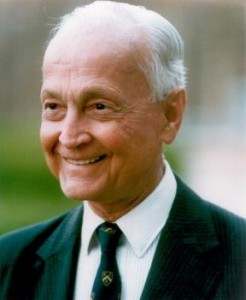 As I’ve worked on questions of religion and reason, both in the academy and as a journalist, the John Templeton Foundation has been around every turn. As I called, corresponded, and visited with many of the leading thinkers in the science-and-religion discussion, caution was the prevailing tone—some even joked that I should get them on the record saying something nice about the foundation. Those not applying for money now expect to do so in the future, if they haven’t taken a principled stand against it. It is probably for this reason that, in all the books and articles published on science and religion year after year, none addresses in any great depth what is really the biggest science-and-religion story of the last quarter-century: the Templeton Foundation itself.
As I’ve worked on questions of religion and reason, both in the academy and as a journalist, the John Templeton Foundation has been around every turn. As I called, corresponded, and visited with many of the leading thinkers in the science-and-religion discussion, caution was the prevailing tone—some even joked that I should get them on the record saying something nice about the foundation. Those not applying for money now expect to do so in the future, if they haven’t taken a principled stand against it. It is probably for this reason that, in all the books and articles published on science and religion year after year, none addresses in any great depth what is really the biggest science-and-religion story of the last quarter-century: the Templeton Foundation itself.
 With a new article called “God, Science and Philanthropy” in The Nation, I’ve attempted to change that. It’s a close look at a fascinating and controversial organization, created by a most uncommon man:
With a new article called “God, Science and Philanthropy” in The Nation, I’ve attempted to change that. It’s a close look at a fascinating and controversial organization, created by a most uncommon man:
Templeton’s own spirituality was eclectic. Though a lifelong Presbyterian, he imbibed the wisdom of religions both Eastern and Western, ranging from his friend Norman Vincent Peale, the prophet of the organization man, to Ramakrishna. Early on, his mother exposed him to the Unity School of Christianity, a turn-of-the-century movement that emphasized positive thinking and healing through prayer. The Unity School considered itself progressive and even, loosely speaking, scientific: a practical application of Christianity to modern life.
Out of his humble origins in small-town Tennessee, Templeton built a career as one of the great architects of globalization—”the dean of global investing,” Forbes once dubbed him. As he grew older, though, his wealth ever multiplying, Templeton began turning his attention away from business. “All my life I was trying to help people get wealthy, and with a little success. But I never noticed it made them any happier,” he told Charlie Rose in a 1997 interview. “Real wealth is not in money; it’s in spiritual growth.”
It’s yet another chapter in history’s sloppy tango between science and religion. Though the article is far short of the expose he might have preferred, in a comment on his blog, no less than Richard Dawkins said, “I actually find it quiet [sic] hard to imagine how a five page article about the Templeton Foundation and its weaselling ways could have been more informative.”
More mentions around the web:
Andrew Sullivan’s Daily Dish: God’s Think Tank
3 Quarks Daily: The Templeton Foundation: God, Science and Philanthropy
Pharnygula: Templeton gets an invigorating massage, with a little deep pressure and an occasional gentle thump
Evolving Thoughts: On Templeton money
Irtiqa: The Templeton Foundation Dilemma
Rod Dreher, director of publications at Templeton: Science, religion and Templeton: A defense
Comments
One response to “The Politics of Big Questions: The John Templeton Foundation”
[…] primarily funds research projects at the intersection of science and faith. It’s written by Nathan Schneider, one of my favorite writers on religion, and he even finds a way to make the Nation-obligatory […]